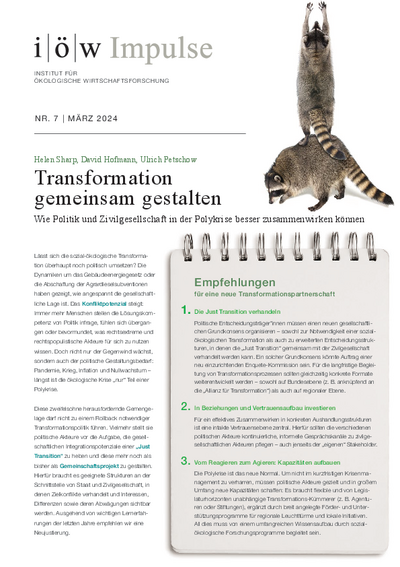Shaping transformation together How politics and civil society can engage better in the polycrisis
Can the socio-ecological transformation still be implemented politically? The ecological crisis is being compounded by many other crises, from pandemics and war to empty coffers, as well as crises of democracy and social cohesion. This polycrisis forms the new context for political action. However, instead of being a common challenge, the necessary socio-ecological transformation in this context is increasingly developing into a field with the potential to divide society – a dynamic that is increasingly being fueled and exploited by right-wing extremist and right-wing populist actors in particular.
This complex situation must not lead to a rollback of necessary transformation policies. Rather, it presents political actors with the task of realizing the integrative potential of a “Just Transition”. For this joint project, the impulse paper recommends suitable structures at the interface between the state and civil society in which conflicts of objectives can be better negotiated. Based on interviews with representatives from federal ministries, politics, civil society and academia, the authors recommend a realignment:
1. Negotiating the just transition
Political decision-makers must organize a new basic social consensus – both on the necessity and design principles of a socio-ecological transformation, and on expanded decision-making structures in which the just transition can be negotiated together with civil society. Such a basic consensus could be the task of a new Enquete Commission. At the same time, concrete formats should be further developed for the long-term monitoring of transformation processes: This includes both the federal level (e.g. following on from the “Alliance for Transformation”) and the regional level.
2 Investing in relationships and building trust
An intact level of trust is central to effective engagement between political and civil society actors. To this end, the various parties involved should maintain continuous, informal channels of communication – extending beyond their usual stakeholders.
3. From reacting to acting: Building capacities
The polycrisis is the new normal. To avoid getting bogged down in short-term crisis management, political actors must create new capacities in a targeted manner and on a large scale: There is a need for long-term “caretakers” for transformation (e.g. agencies or foundations), supplemented by broad-based funding and support programs for regional pilot projects and local initiatives. All of this must be accompanied by extensive knowledge building through socio-ecological research programs.



